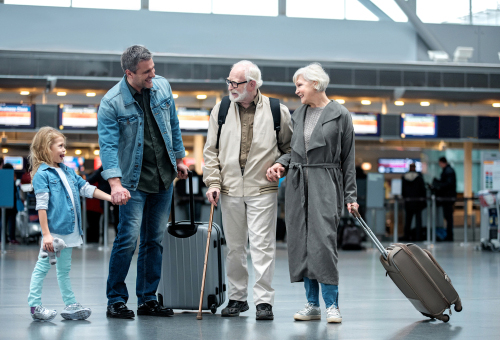 Most people, no matter their age, are chomping at the bit to be out and about and traveling after enduring the isolation during the Pandemic. While there are still cases of this dreaded virus, many are vaccinated and are looking forward to spending time with family and exploring new places.
Most people, no matter their age, are chomping at the bit to be out and about and traveling after enduring the isolation during the Pandemic. While there are still cases of this dreaded virus, many are vaccinated and are looking forward to spending time with family and exploring new places.
Relationships are built and strengthened through shared experiences and traveling together builds memories as well. Here are some guidelines to keep in mind if you are planning a vacation that includes elderly loved ones.
Take into consideration medical issues and physical limitations.
Travel decisions depend on an individual’s medical assessment. The primary care doctor’s office should be the first stop to ensure that any medical issues are evaluated so that travel doesn’t present a risk. Vaccinations may be needed, and you want to be sure to have adequate medicines on hand. Make certain to have a written list of medications, supplements, and dosages and bring meds in original containers split between carry-on and checked luggage.
Coronavirus Precautions
The Pandemic is still a part of life with new variants and rising cases in some locations. Be sure to follow doctors’ recommendations regarding masks, vaccinations, and boosters, especially if your loved ones are immunocompromised or have other health conditions. Outdoor activities are preferable; avoid crowds, schedule rest time, and reduce stressful situations.
Plan
It is important that elderly individuals keep a level of routine during travel, maintaining a familiar sleep and meal schedule and taking medications on time. Be sure to consider planned activity and exertion levels so you do not have unreasonable expectations for elderly members of the family. Don’t overschedule and plan for delays. Before your trip, be sure to talk with family members about what they want to see and do. When priorities overlap, you’ve found the “sweet spot” of things to plan. Is there a particular restaurant one wants to go to? Does another want to sit by the pool all day? If you want to take a tour, check to see that it can accommodate mature travelers and any physical limitations you may have.
Getting to Your Destination
For road trips, it may be wise to book a hotel room midway through long drives. Take advantage of local roadside attractions for rest stops and stretching breaks. If traveling by air, try to purchase refundable tickets and direct flights when airports are not unusually busy. Select a row with an available aisle seat near the lavatory. Arrange for a
wheelchair, early boarding, onboard assistance, and oxygen, if necessary. Bring along an extra pillow and blanket to ensure comfort. Call or email TSA Cares for information on support for elderly travelers. You might consider train travel so you can sit back and enjoy the scenic views. No matter how you travel, be sure you have snacks, water, and entertainment (magazines, books, electronic devices) for all travelers.
When You Arrive
In a hotel, adjoining rooms are helpful. A room by the elevator is preferable so there isn’t a lot of walking to get to and from your room. An audio monitor at night is helpful if you have concerns about your loved one getting out of bed at night or falling. If a handicapped-accessible room is needed, be sure to book in advance. The U.S. State Department’s online information for travelers with disabilities is a helpful resource.
What’s Most Important
Whatever you decide your vacation plans will include, make sure there is plenty of opportunities for the family to interact with each other. Adapt to the situation and needs. What matters is having a good time and creating memories together.
That’s what you will all remember when the vacation is over.
